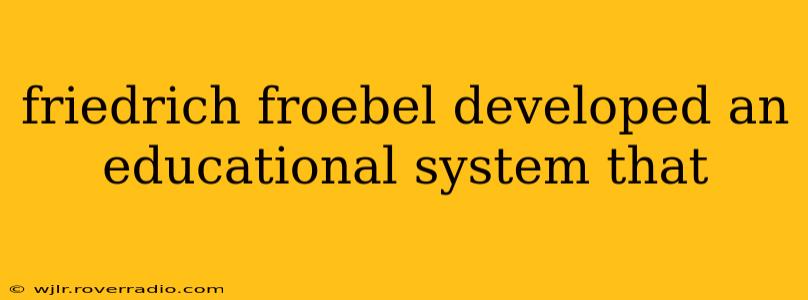Friedrich Fröbel (1782-1852), a German pedagogue, profoundly impacted early childhood education with his innovative approach. He's widely considered the father of kindergarten, a term he coined, and his system emphasized play-based learning and the importance of a child's natural development. His educational philosophy wasn't simply about teaching; it was about nurturing the whole child—intellectually, emotionally, and spiritually. Let's delve deeper into the core principles of Fröbel's revolutionary educational system.
What are the Core Principles of Fröbel's Educational System?
Fröbel's system rests on several key pillars:
-
Play as a Learning Tool: Fröbel believed that play isn't merely recreation; it's a fundamental aspect of a child's learning process. Through play, children explore their world, develop their creativity, and build essential skills. His "gifts" and "occupations" were specifically designed to facilitate this learning through playful engagement.
-
The Importance of Nature: He strongly advocated for integrating nature into the learning environment. Children were encouraged to interact with nature, observing, exploring, and learning from it. This connection to nature was seen as crucial for their holistic development.
-
Self-Activity: Fröbel emphasized the importance of self-activity and self-expression. Children were not passive recipients of knowledge but active participants in their learning journey. They were encouraged to discover and create, fostering independence and self-reliance.
-
Holistic Development: Fröbel's approach aimed at developing the child as a whole—intellectually, physically, emotionally, and spiritually. This holistic approach recognized the interconnectedness of these aspects and sought to nurture each one harmoniously.
-
Gifts and Occupations: These structured play materials, meticulously designed by Fröbel, are the hallmark of his system. Gifts were sets of geometric forms, while occupations involved activities like weaving, modeling, and drawing. These materials were instrumental in developing children's creativity, problem-solving skills, and fine motor coordination.
What are Fröbel's Gifts and Occupations?
Fröbel's "gifts" were a series of structured play materials, progressing in complexity. They provided children with opportunities to explore shapes, sizes, and spatial relationships. The "occupations" were activities that complemented the gifts, allowing children to engage in creative expression and fine motor skill development. These materials were thoughtfully designed to encourage self-directed learning and exploration.
How Did Fröbel's System Influence Modern Education?
Fröbel's influence on modern education is undeniable. His emphasis on play-based learning, the importance of early childhood education, and the use of structured materials have had a lasting impact on pedagogical approaches worldwide. Many aspects of modern early childhood education programs—from kindergarten classes to Montessori schools—reflect his enduring legacy. His belief in the importance of holistic child development continues to inform educational philosophies today.
What is the Difference Between Fröbel's Kindergarten and Modern Kindergartens?
While modern kindergartens share common ground with Fröbel's original vision, there are key differences. Modern kindergartens have adapted to incorporate diverse learning styles and incorporate a broader range of subjects and activities beyond those Fröbel initially envisioned. The curriculum is often more structured and standardized than in Fröbel's time. However, the fundamental principle of play-based learning and nurturing a child's natural development remains a core element of many contemporary kindergarten programs, acknowledging Fröbel's foundational contribution.
What are Some Criticisms of Fröbel's System?
While widely praised, Fröbel's system has also faced criticism. Some argue that his structured approach to play may stifle a child's spontaneous creativity. Others question the universality of his methods, suggesting that they may be less effective for children from different cultural backgrounds or with diverse learning styles. However, the core principles of his approach continue to resonate within educational discussions today. These ongoing discussions highlight the importance of adapting and refining educational methodologies to best serve the ever-evolving needs of children.
